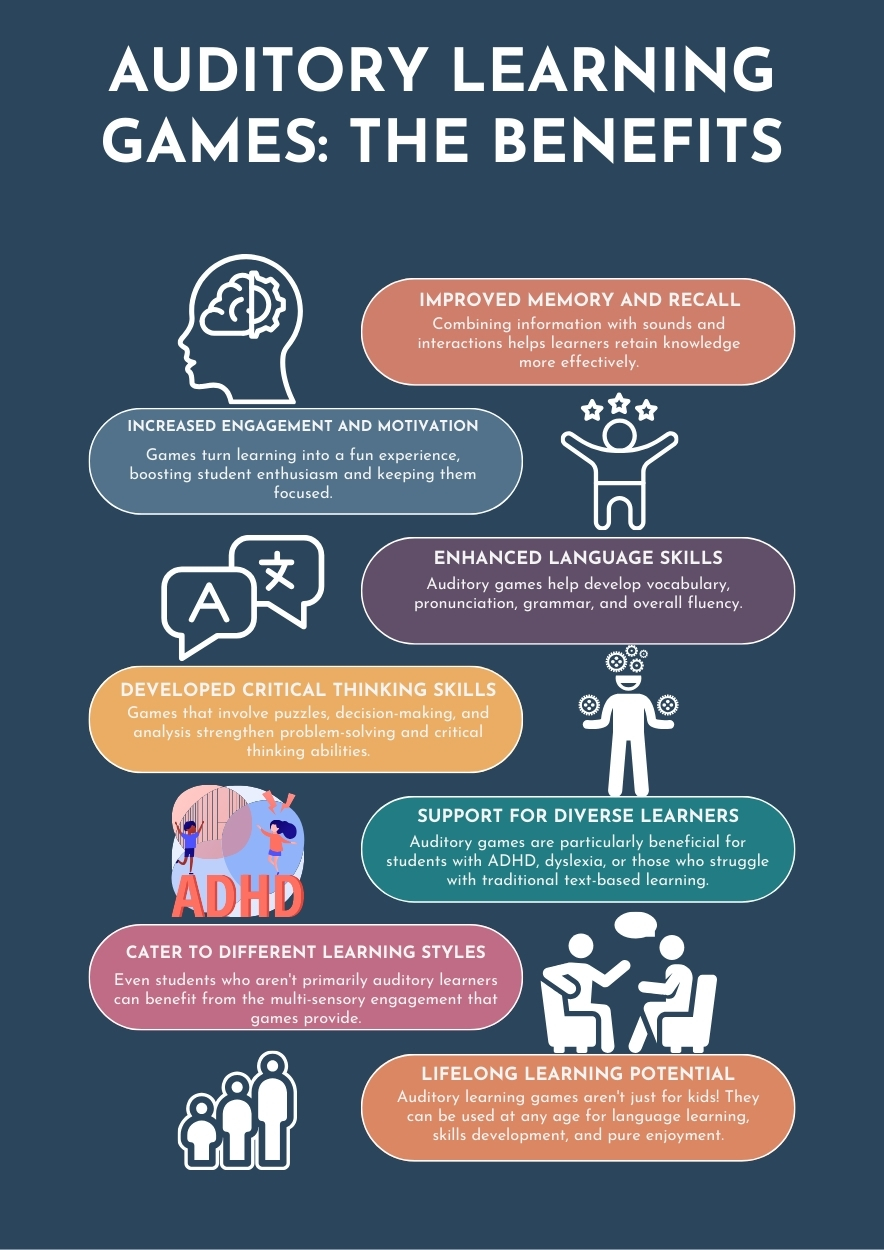Do you learn best by listening? Do instructions stick in your mind better when you hear them spoken aloud? If so, you might be an auditory learner! Auditory learners thrive when information is presented through sound. Think lectures, discussions, audiobooks, and yes – even games! Let’s explore how auditory learning games can make learning fun, engaging, and incredibly effective.
What are Auditory Learning Games?
Auditory learning games use sounds, music, spoken words, and interactive elements to teach concepts, reinforce skills, and spark a love of learning. They go beyond just hearing information; they encourage active participation and problem-solving in a way that resonates with auditory learners.
Why are Auditory Learning Games So Effective?
- Engages a Primary Learning Style: These games cater directly to how auditory learners absorb information best.
- Boosts Memory and Recall: Combining information with sounds and interactions creates stronger memory pathways in the brain.
- Breaks Up Monotony: Games add variety and fun to learning, making it more enjoyable and helping students stay focused.
- Suits Diverse Needs: Auditory learning games can be helpful for students of all ages, and especially beneficial for those with attention difficulties or who struggle with traditional reading-based learning.

Types of Auditory Learning Games
The world of auditory learning games is incredibly diverse! Here are a few popular types:
- Musical Games: Think learning multiplication facts set to catchy tunes, or identifying historical events through songs.
- Verbal Games: From “Simon Says” to word-guessing games, these put listening skills and vocabulary to the test in an engaging way.
- Sound-Based Puzzles: Imagine identifying animal sounds, solving riddles based on audio cues, or even learning about music composition.
- Interactive Storytelling: Games where players make choices that affect the audio narration teach decision-making and cause-and-effect in a memorable way.
- Technology-Driven Games: Apps, educational podcasts, and audiobooks offer a wealth of interactive auditory learning experiences.
Auditory Learning Games for All Ages
Now that we’ve explored the different types of auditory learning games, let’s dive into specific examples that can be enjoyed by learners of all ages:
Early Childhood (Ages 3-7): Where Learning is Musical!

Little ears perk up to the sounds of music and stories! Here’s how to turn these everyday activities into powerful learning experiences for your young child:
Sing Your Way to Learning: Songs as Teaching Tools
- Why Music Matters: Songs help young children develop language skills, memory, and a sense of rhythm. Plus, they’re just plain fun!
- Beyond the Classics: There are endless songs for teaching numbers, the alphabet, colors, shapes… and even subjects like science and healthy habits!
- Get Creative: Make up your own silly songs about everyday routines (brushing teeth, putting on shoes) or use familiar tunes with new lyrics about what your child is learning.
Story Time Extravaganza
- Act it Out: Encourage your child act out animal sounds, weather changes, or even the emotions of the characters in the story.
- Silly Voices: Experiment with using different voices for different characters – it makes stories come alive and boosts imagination!
- DIY Sound Effects: Use simple props (tapping a glass for rain, shaking a box of beans for a rattlesnake) to create sounds that match the action in the story.
Can I Use Questions in My Games?
Absolutely! Questions spark curiosity and keep little learners engaged. Try incorporating questions like:
- “What sound does a cow make?” (during story time or in a song)
- “Can you sing a song about the color blue?”
- “What other words rhyme with cat?”
Elementary School (Ages 8-12)
Elementary school kids are ready for more complex auditory challenges and games that put their skills to the test. Here’s how to keep them engaged:
Rhyme Time Challenge
- How it Works: Start by saying a simple word. The next person has to say a word that rhymes. Keep going, taking turns and getting sillier as you progress!
- The Learning Benefits: This fast-paced game boosts vocabulary, phonemic awareness (picking out sounds in words), and encourages quick creative thinking.
- Up the Challenge: Set a theme (food, animals, sports) to get those brains working hard!
Mystery Sounds Game: Can You Guess What You Hear?
- Get Collecting: Record a variety sounds: musical instruments, nature sounds, objects around the house, even silly sounds you make!
- Game Time: Play a short clip and have kids guess the source of the sound.
- Why it Works: This develops focus, listening skills, and the ability to analyze what they hear.
Podcast Power: Discover a World of Audio Learning
- Find the Fun: Explore podcasts made specifically for kids on science, history, storytelling, and more. Many are packed with sound effects and humor.
- Discussion Time: After listening, encourage your child to tell you about what they learned. Ask questions like, “What was the most surprising thing?” or “Does this remind you of anything else you’ve studied?”
- Resources: Check out online podcast directories and educational websites for recommendations tailored to your child’s interests.
Middle School (Ages 13-14)
Middle schoolers are ready for auditory learning experiences that are both fun and intellectually stimulating. Here are a few ideas to get them excited:
Foreign Language Learning Games
- App Adventures: Language learning apps are packed with features like interactive dialogues, pronunciation practice, and even games that use voice recognition technology.
- Level Up The Learning: This is a great way to supplement traditional language classes. Encourage students to play short games during study breaks or listen to audio lessons while walking to school.
- Make it Social: Can your teen find online forums or groups where they can practice conversing with native speakers in the language they’re learning?
Debate Club: The Power of Persuasive Listening
- Beyond Just Talking: Debates teach the art of active listening! Students must carefully analyze their opponent’s arguments in order to counter them effectively.
- Real-World Relevance: This builds critical thinking skills, public speaking confidence, and the ability to understand diverse perspectives – essential for success in school and beyond!
- Friendly Competition: Organize a debate tournament within your class or school to make it extra fun and engaging.
Diving Deeper Into Storytelling
- Family Listening Time: Choose an audiobook that everyone might enjoy (think fantasy, adventure, or historical fiction).
- Beyond Passive Listening: Set time after a few chapters to discuss the book. Ask questions like “What do you predict will happen next?”, “If you were the main character, what would you do?”, or “Does this remind you of anything from history class?”
- Critical Thinking Boost: This develops listening comprehension, inspires discussion of complex themes, and promotes a lifelong love of literature.
High School (Ages 15-18) & Beyond
High school and beyond is about prepping for college, careers, and lifelong learning. Auditory strategies can be a major asset! Here’s how to maximize their benefits:
Auditory Note-Taking Techniques: Your Lectures, Replayed
- Record and Review: Encourage students to record lectures (with the instructor’s permission) so they can actively listen the first time and then fill in their written notes later.
- Tech Tools: Explore note-taking apps that sync with audio recordings, making it easy to jump to specific sections.
- Beyond College Too: This is a valuable skill for meetings, seminars, and professional development throughout life!
Learning a Musical Instrument: The Brain Boost
- It’s Not Just About Music: Playing an instrument strengthens auditory processing, which is the brain’s ability to understand sounds. This can have benefits for learning and focus.
- Discipline and Dedication: Studying music builds perseverance, problem-solving skills, and attention to detail.
- Never Too Late: Encourage teens or adult learners to pick up an instrument—it’s a fun hobby at any age.
Language Learning Through Audio Immersion
- Surround Yourself with Sound: Listen to music, news programs, podcasts, and audiobooks in the language you’re learning.
- Passive vs. Active: Start by just absorbing rhythms and tones. Then, try to identify specific words, phrases, and imitate pronunciation.
- Gamify It: Many language apps offer speech recognition practice and engaging listening exercises that make learning immersive and fun.
| Age Group | Game Types | Examples |
|---|---|---|
| Early Childhood (3-7) | Musical Games, Interactive Storytelling, Sound Exploration | “Twinkle Twinkle Little Star” with actions, Storybooks with sound effects, Guess the Animal Sound |
| Elementary (8-12) | Rhyming Games, Podcasts, Audiobooks with Discussion | Rhyme Time Challenge, Science podcasts like “Brains On!”, “The Odyssey” audiobook |
| Middle School (13-14) | Language Learning Apps, Debate, Audiobooks with Analysis | Duolingo, Debate tournaments, “Harry Potter” audiobook with character analysis questions |
| High School & Beyond | Note-taking with Audio Recordings, Learning an Instrument, Immersive Language Learning | Lecture capture apps, Music lessons, News programs in the target language |
FAQs
Wrapping Up
By incorporating auditory learning games into your teaching toolkit or at-home learning, you unlock a world of exciting and effective learning possibilities. These games make learning fun, cater to diverse learning styles, and boost memory and engagement.
Remember, it’s about finding what sparks joy and curiosity! Start with the ideas in this guide, experiment, and discover what makes learning truly resonate for you or your child. The world of sound-based learning awaits!
